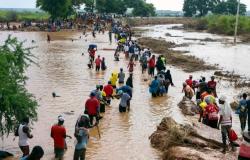Photo credit, BBC Studios/Fleur Bone
- Author, Lucy Wallis
- Role, BBC News
-
11 minutes ago
Professor Brian Cox says he is ready to go where no British TV presenter has gone before.
“I haven’t yet raised the funds or persuaded anyone to give me a ticket” to space, he says.
But he says that if Elon Musk, the owner of the American aerospace company SpaceX, contacted him to offer such a trip, he would respond: “Great, let’s go!”
Going to space is something we could all do in the future, says Mr Cox, the UK’s best-known particle physicist.
On the occasion of the premiere of his new program on the solar system for the BBC, the expert says in an interview that humanity must go further.
According to him, the progress made by some commercial space companies opens the way to the possibility of becoming a multiplanetary and interstellar civilization.
Photo credit, Courtesy SpaceX
One person beat the physicist into space: billionaire entrepreneur Jared Isaacman, a member of SpaceX’s Polaris Dawn crew.
Mr. Isaacman made history last month by becoming the first private sector astronaut to walk in space. The US space agency (NASA) said the mission represented “a major step forward” for the commercial space industry.
Mr Cox believes this combined approach – a collaboration between government agencies, such as NASA, and private companies, such as SpaceX – is a good thing. Having cheap and reliable access to space is vital, he says.
“I really believe that our civilization needs to expand beyond our planet for many reasons,” he says.
Aerospace company Blue Origin, created by billionaire Amazon founder Jeff Bezos, is already imagining a future where people live and work in space, and industries perceived as harmful to Earth move into the cosmos.
Earth’s resources are limited and the planet is being damaged by “civilization’s thirst and need for more resources,” says Cox, making it imperative to seek to become a multi-planetary civilization.
Photo credit, BBC Studios/ Nick Gaven
Exploiting the universe’s resources through asteroid mining may seem like science fiction, but, he says, “it’s extremely important that we do it, and as quickly as possible.” “.
He admits, however, that the political capacity to achieve this goal as a civilization is another matter and believes that we have a duty to explore our galaxy, the Milky Way, which is filled with hundreds of billions of stars.
In our solar system, there is much to explore. Besides the Sun, there are eight planets, five officially named dwarf planets, hundreds of moons, thousands of comets, and more than a million asteroids.
If we have to hazard a guess, Professor Cox says we are probably the only advanced civilization in the Milky Way at present, and perhaps the only one that has ever existed in the galaxy.
“If this is true, our expansion beyond this planet becomes a necessity. Because if we don’t do it, no one else will,” he explains.
“It is therefore of the utmost importance to start taking the first steps,” he adds.
Photo credit, Getty Images
Mars and the Moon are the only two places Cox says anyone will go and a permanent presence of life will begin to take hold.
Although stadium-sized asteroids pass through the solar system, he believes the greatest danger to Earth today lies in its inhabitants.
“If anything is going to destroy us, it’s probably going to be us,” he says.
He admits, however, that the possibility of an asteroid hitting Earth is taken more seriously today than when he started making TV shows more than 15 years ago.
“At some point we’ll have to divert one,” he says.
Photo credit, Getty Images
For his new series, Mr. Cox explores events in space through the latest missions.
In October, NASA’s Europa Clipper will begin a five-and-a-half-year journey to Jupiter to determine whether the planet’s icy moon, Europa, has the conditions necessary for life to arise.
Scientists believe that Europa has liquid water in the form of a vast ocean of salt water beneath its icy crust.
But what would life be like in Europe if the conditions were right?
“It will be a simple life,” says the professor.
“At best it will be single-celled life, or something a little like it…We don’t expect multicellular life, partly because it took so long to develop here on Earth,” he adds.





